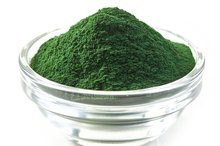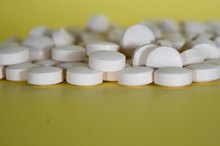Chlorella Spirulina Detox Symptoms
Chlorella and spirulina are both types of algae that are commonly marketed as supplements. Chlorella is a form of green algae, and spirulina is a type of blue-green algae. Chlorella is a rich source of chlorophyll, and spirulina provides a variety of proteins, vitamins and minerals. Supplement manufacturers often combine chlorella and spirulina in products marketed as detoxifying supplements. While both chlorella and spirulina are generally considered safe for adult consumption, taking detox supplements with chlorella and spirulina may cause a variety of symptoms.
Toxins
Chlorella and spirulina manufacturers promote their ability to detoxify the body by absorbing toxic heavy metals. Unfortunately, while there's no evidence that ingesting either algae helps detoxify the body, both do absorb any heavy metals in their natural environment. The National Institutes of Health warns that if you consume chlorella or spirulina harvested from a polluted source, you may consume toxic heavy metals. Spirulina may also contain microsystins or potentially deadly bacteria that can affect liver and central nervous system function, according to the State of Washington Department of Ecology.
- Chlorella and spirulina manufacturers promote their ability to detoxify the body by absorbing toxic heavy metals.
- The National Institutes of Health warns that if you consume chlorella or spirulina harvested from a polluted source, you may consume toxic heavy metals.
Phenylketonuria
Spirulina Side Effects
Learn More
Phenylketonuria is a genetic congenital inability to metabolize the amino acid phenylalanine. When phenylalanine builds up in the body, it can cause irreversible brain damage in infants and behavioral disorders and seizures in older children. Spirulina is a rich source of many amino acids, including phenylalanine, and should be strictly avoided by anyone suffering from phenylketonuria.
Increased Immune Response
Proponents of both chlorella and spirulina tout their supposed immune-boosting properties, but not everyone benefits from increased immune function. The University of Maryland Medical Center warns that people suffering from autoimmune diseases, where the immune system attacks healthy cells in the body, may experience an increase in disease activity if they take cholella or spirulina. Common autoimmune diseases include rheumatoid arthritis, lupus, multiple sclerosis and pemphigus vulgaris.
General Symptoms
Spirulina Pros & Cons
Learn More
While non-contaminated spirulina appears safe for adult use, chlorella can cause allergic reactions, including hives and rashes. Chorella can also cause significant gastrointestinal discomfort, including gas, abdominal cramping, constipation, diarrhea and nausea. One-third of those who try taking chlorella find the gastrointestinal effects too severe to continue use. Fatigue, irritability and lethargy are other common symptoms. Chlorella also contains high levels of vitamin K, which can interact with blood-thinning medications.
- While non-contaminated spirulina appears safe for adult use, chlorella can cause allergic reactions, including hives and rashes.
- Chorella can also cause significant gastrointestinal discomfort, including gas, abdominal cramping, constipation, diarrhea and nausea.
Related Articles
References
- American Cancer Society: Chlorella
- University of Maryland Medical Center: Spirulina
- MedlinePlus: Blue-green algae
- MayoClinic.com: Phenylketonuria (PKU)
- Kwak JH, Baek SH, Woo Y, et al. Beneficial immunostimulatory effect of short-term Chlorellasupplementation: enhancement of Natural Killer cell activity and early inflammatory response (Randomized, double-blinded, placebo-controlled trial). Nutr J. 2012;11:53. doi:10.1186/1475-2891-11-53.
- Azamai ESM, Sulaiman S, Habib SHM, et al. Chlorella vulgaris triggers apoptosis in hepatocarcinogenesis-induced rats. J Zhejiang Univ Sci B. 2009 Jan;10(1):14-21. doi:10.1631/jzus.B0820168.
- Azocar J, Diaz A. Efficacy and safety of Chlorella supplementation in adults with chronic hepatitis C virus infection. World J Gastroenterol. 2013 Feb 21;19(7):1085-90. doi:10.3748/wjg.v19.i7.1085.
- Nakano S, Takekoshi H, Nakano M. Chlorella pyrenoidosa supplementation reduces the risk of anemia, proteinuria and edema in pregnant women. Plant Foods Hum Nutr. 2010 Mar;65(1):25-30. doi:10.1007/s11130-009-0145-9.
- National Center for Complementary and Integrative Health. Traditional Chinese Medicine: What You Need To Know. Bethesda, Maryland; updated April 29, 2019.
- Ryu NH, Lim Y, Park JE, et al. Impact of daily Chlorella consumption on serum lipid and carotenoid profiles in mildly hypercholesterolemic adults: a double-blinded, randomized, placebo-controlled study. Nutr J. 2014 Jun 11;13:57. doi:10.1186/1475-2891-13-57.
- Park HJ, Lee YJ, Ryu HK, Kim MH, Chung HW, Kim WY. A randomized double-blind, placebo-controlled study to establish the effects of spirulina in elderly Koreans. Ann Nutr Metab. 2008;52(4):322-8. doi:10.1159/000151486
- Man LX. Complementary and alternative medicine for allergic rhinitis. Curr Opin Otolaryngol Head Neck Surg. 2009 17(3):226-31. doi:10.1097/MOO.0b013e3283295791
- Cingi C, Conk-Dalay M, Cakli H, Bal C. The effects of spirulina on allergic rhinitis. Eur Arch Otorhinolaryngol. 2008 265(10):1219-23. doi:10.1007/s00405-008-0642-8
- Lee EH, Park JE, Choi YJ, Huh KB, Kim WY. A randomized study to establish the effects of spirulina in type 2 diabetes mellitus patients. Nutr Res Pract. 2008 2(4):295-300. doi:10.4162/nrp.2008.2.4.295
- Mani UV, Desai S, Iyer U. Studies on the Long-Term Effect of Spirulina Supplementation on Serum Lipid Profile and Glycated Proteins in NIDDM Patients. Journal of Nutraceuticals, Functional & Medical Foods, 2000;2:3, 25-32. doi:10.1300/J133v02n03_03
- Mathew B, Sankaranarayanan R, Nair PP, et al. Evaluation of chemoprevention of oral cancer with Spirulina fusiformis. Nutr Cancer. 1995;24(2):197-202. doi:10.1080/01635589509514407
- Torres-duran PV, Ferreira-hermosillo A, Juarez-oropeza MA. Antihyperlipemic and antihypertensive effects of Spirulina maxima in an open sample of Mexican population: a preliminary report. Lipids Health Dis. 2007;6:33. doi:10.1186/1476-511X-6-33
- U. V. Mani, S. Desai & U. Iyer (2000) Studies on the Long-Term Effect of Spirulina Supplementation on Serum Lipid Profile and Glycated Proteins in NIDDM Patients. Journal of Nutraceuticals, Functional & Medical Foods, 2:3, 25-32. doi:10.1300/J133v02n03_03
- Miczke A, Szulińska M, Hansdorfer-Korzon R, et al. Effects of spirulina consumption on body weight, blood pressure, and endothelial function in overweight hypertensive Caucasians: a double-blind, placebo-controlled, randomized trial. Eur Rev Med Pharmacol Sci. 2016;20(1):150-6.
Writer Bio
Christine Gray began writing professionally in 1997, when a trade publishing company hired her as an assistant editor. She wrote her first screenplay in 1998 and has been covering health and nutrition since 2009. Gray graduated with a Bachelor of Arts in English literature from the University of Michigan.









